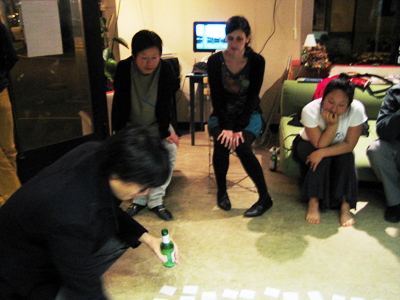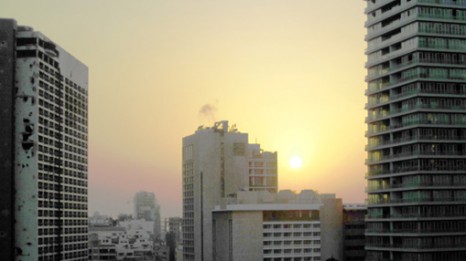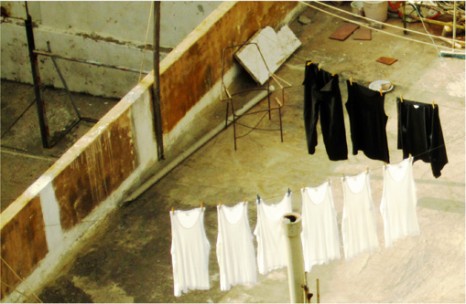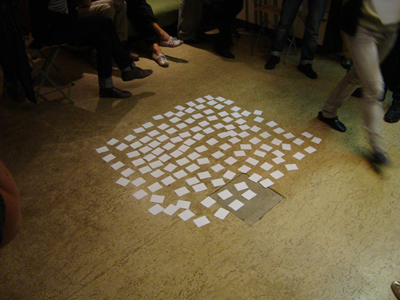THE WORK (for 絵美 and a friend of hers, and for everyone amidst iwishicoulddescribeittoyoubetter)
How could this be institutionalised? In describing, putting the words to entities, in finding vocabularies and knowing where to look, we are trapped already. How couldn’t we be? Should I write such that you never understand; should I make work that never needs to be seen; should anything other than question marks arise?
Is this a work? Would we rather toss it all off to a little game, scoff at those who take themselves too seriously, never be so ridiculous as to consider the nests of “art” and “life”? Are the words one is using as important as the to whom one is speaking? “What is the work of man?” And why not say it, invest oneself with intention, make the attempt? Flail? This is not an institution, as could it ever be, with time, with the fulfillment of certain criteria of Work. We are tied to a production as always, since before we were aware of it, since we were animals. And the guillotined bumblebee, as Agamben asks, is he as busy as ever, do we continue amidst work, does time fly when…?
Should anything other than question marks arise?
What-is-the-work?
Should the work be defined by a trade, a certain amount of craftsmanship, the ergon of man, a list of projects and venues to which one must be flown? Does work define our activities or does activity define work? Why should vita contemplativa be placed above vita activa in a society with no God? Is this the captivation of the bumblebee, are we productive enough, should we make particular dialogues in work-group fashion? Because if I play, or if i dangerously mix words like “art” and “life”, like you know, when
Every afternoon he goes there to see a big painting for two hours, and he says, ‘I’m doing the work to see the work’. That’s ok, I think it’s no problem. He did another work where he pays for three months of traditional Chinese music lessons, on the erhu. – 马永峰 MA Yongfeng, Forget Art
Can a situation be Work? Our particular arrangement to one another, did you try that out, were you networking? Is the amount of control in any given situation a Work? Is control a result of the fact that there is no one around to help us, or that we are ‘mere’ fascists? Is the controlled situation a place of God or science or politics? Why do you question, why go beyond captivation? What did you question, what did you create, where did you control the situation and where was spontaneity a lie? 艾未未 AI Weiwei calls it the “vocabulary” that “can also be the total meaning of the concept”; Pierre Huyghe says a one:to:one ratio of idea:to:form. These are control experiments, perhaps, but not without the certain seepages that blur the distances between the Work and our ethics, our politics——our everyday. We take ourselves too seriously. In the fullness of the situation, yes. And yes, he is right, we could not presume it to be so before its occurrence, where there is thus the very small moment when the lack of control has perchance to touch upon the work’s going beyond itself. An eventfullness…
Have we said too much already? Really, should anything other than question marks arise?
Are these thinly veiled treatises, and what have you really got to say?
Stopping oneself… (slow, slow loading, please be patient)
Posted by 丫 | more »by the end of august i’ll surrender. (please tell me, if i did anything wrong) Posted by daniel | reply »
measures of resistance
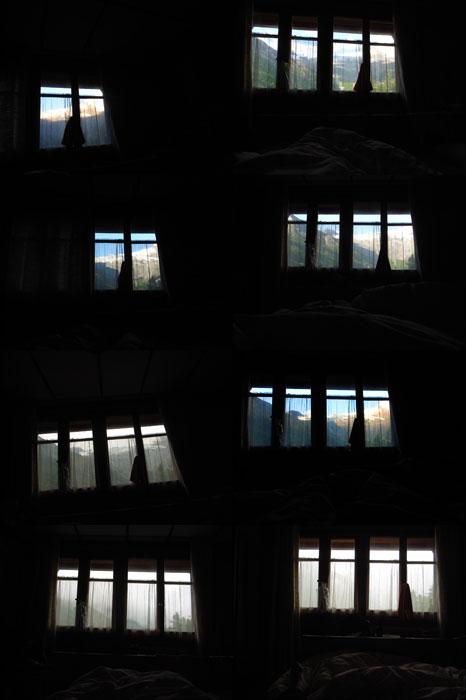
a reminder
we draw or we see. sometimes. as in her new word: “para-meters”
or we see. sometimes. as in her new word: “para-meters”
third spaces
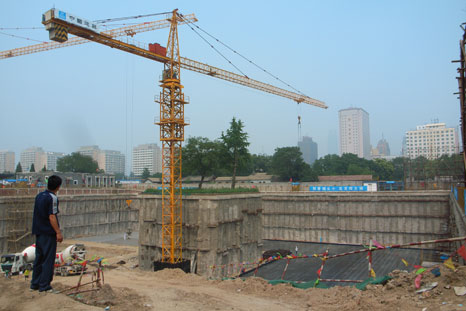
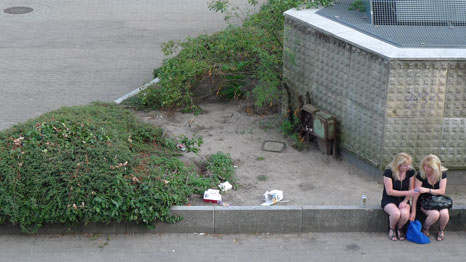

realistically speaking
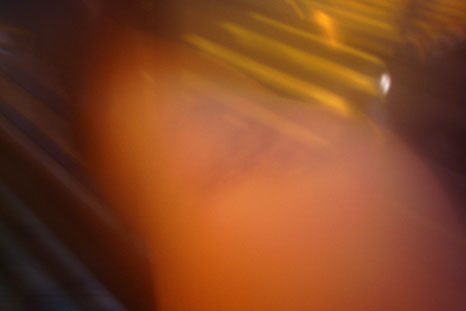
You spoke of the beginnings of a new metaphor with which we should look at our present condition, like living in Beijing, realistically. Our metaphors come from bicycle encounters and the emotional outcroppings of the everyday. at the time i could only see flesh as a gliding, swerving in and around vehicles, going without cutting corners. We laughed about the flows.
The flesh as meat——not as skin, as I had previously so imagined——is a space of tightness, of form and intimacy and movement as a squeezing of space. Skin as a gliding over and around, all options open except that one moves merely as a compatriot of gravity, touching, just going. Where do we look, realistically, while on our bicycles, in encounter? Nobody cares. Movement is a question of whomever may 让 first, usually predicated upon size. But let us enlarge our frame of view. To examine our reality here is a fleshy matter, full of scars and circumstance. Situationism could be given, rather, a form of agency. Adjacency. Victorious life proposes a next-to. If we were to give up subjectivity and objectivity, can movement presume, ex-stasis? Flow is always a making up of what came before, along the lines of a scar, reaction and healing. Let us make up for imperial autocracy, let us make up for capitalist pigs, let us make up for the sick yellow man! And so we are stuck in a striving or a being, reactionary.
But Vitanza’s scar is a middle place between flesh and skin, along surfaces and imbedded within. Realistically, we find ourselves covering over, working through, both as a form of being and of representation, as spectators and actors, as lifeforms headed inevitably towards death. Is such certainty a place of flesh or of skin? We fall asleep with the TV, we learn to love and hate our lovers. This affect is of flesh and skin, multidirectional, surfaces and interiors all at once.
Scar as both a place and temporality, a contextification. It is the grounding memory of affect, a node upon the flow of the body, or movement ex-stasis. Flashbacks of life in times of death should tear our bodies from such ecstasies; these are the groundings we can never break away from, realistically.
I slipped and hurt myself today, on or off cycles, wet pavement. In the midst of mutual shock, she snapped at me. I’m sorry, I said.
…in the sign of the scar—where foreground and background collapse—negotiating between life and death, skin and scar, public and private, I will hallucinate on a series of cultural objects that would provide us with exemplary ways of “living on” in the scar of the sign as Dasein. But as I do that, note that I do that semiotically across the images being unfolded over there. Da Sein. But. Of Sign. The episode of “Scar Tissue.” I am trying to situate myselves, through a series of interruptions, corruptions, eruptions, between over there and here. Becoming be-tween. Ec-static. Perhaps after a while you, too, will situate yourselves in between there and here.
–Victor Vitanza, “Design as Dasein”: Scar, … to be accompanied by video
Posted by 丫 | more »overseas memory
overseas memory was played on friday 18th of june in zürich
fill out the overseas “steckbrief”: name, 1. question you always asked yourself, 2. question to somebody in the room, 3. question to everyday life, 4. question to intimacy, 5. question to space.
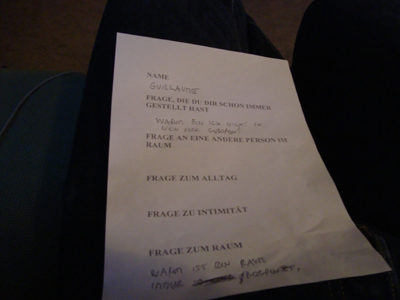
all “steckbrief” are hanging on the wall of inspiration. study who asked which question…
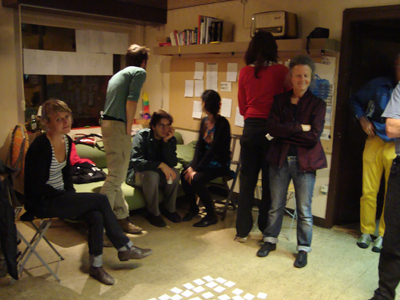
every question exists twice in the memory…
look for the pair of questions and in addition identify the person who asked the question
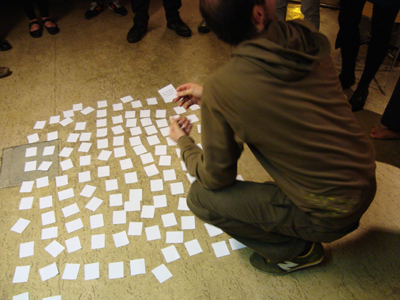
overseas memory is not easy and i didn’t win, but at least i remembered a few questions and i know who asked them…
